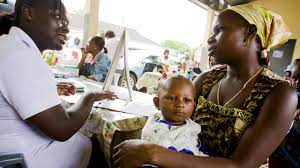In an effort to reduce maternal mortality and child deaths, and to boost primary health care delivery in the country, the federal government has initiated the Community-based Health Research, Innovative-training and Services Programme (CRISP)
The initiative which will be launched next week in Abuja, is a partnership between the Teaching Hospitals, Federal Medical Centres, National Primary Health Care Development Agency, State Primary Health Care Boards, Local Government Health Authorities and the communities to support primary health care development.
Addressing a press conference on the official launch of CRISP in Abuja Wednesday, the Executive Director of National Primary Health Care Development Agency (NPHCDA) Faisal Shuaib said the programme would tackle maternal hearth challenges and improve Primary Health Care Delivery.
He equally said the intervention specifically focuses on increasing, retaining and improving the quality, adequacy, competency, and distribution of a committed multidisciplinary primary health care workforce that includes facility outreach and community-based health workers supported through effective management supervision and appropriate compensation.
According to him, ‘CRISP aims to leverage the rural posting of Resident Doctors from teaching hospitals to boost and guarantee the quality of care at the PHC level through their active involvement in primary health service delivery.
‘This is targeted at improving Reproductive, Maternal, Newborn, Child and Adolescent Health, amongst other health services within the benefiting communities.
“In addition, Human Resources for Health (HRH), particularly Skilled Birth Attendants, such as Medical Doctors, Midwives, Nurses, and Community Health Extension Workers (CHEWs) that have been trained on how to manage emergencies would be recruited and deployed to priority PHC facilities across the country”, .
The Executive Director said government deemed it important and helpful to address the human resource for health gaps in the Primary Health Centres (PHCs) noting that 80% of the incidence of maternal and child deaths in Nigeria occur at the community levels, largely due to the lack of services of skilled health workers in the PHC facilities.
He regretted that the primary health care centres are the most unattractive to the skilled health workers who prefer to be stationed at urban secondary and tertiary health facilities.
The Executive Director said, “While this fact has kept PHC delivery on a setback, we have scientific evidence, showing that the interventions provided by skilled health workers, namely doctors, nurses, midwives, or CHEWs trained on MLSS can reduce maternal and new-born mortality in low and middle-income countries, including Nigeria.
“Consequently, our CRISP initiative will operate at scale involving Teaching Hospitals and Federal Medical Centres across the country.
“This means that the CRISP resident doctors from the engaged teaching hospitals and federal medical centres would be deployed to the primary health care facilities to support service provision and on-the-job capacity building of the PHC health workers.
“CRISP is targeted for implementation across the 36 states of the Federation plus the FCT in a phased manner”,.
Continuing, the NPHCDA boss said: “As a multi-stakeholder investment, CRISP will be funded by the Government of Nigeria with support from development partners, philanthropists, among others.
“In your capacity, the media is also a stakeholder in CRISP. Our call to you is that you support the Government and the communities to create enabling information and environment for successful implementation of CRISP.
“As the saying goes, the wealth of a nation lies in the health of its people. The health and well-being being of the people of Nigeria has remained the government’s priority.
“We therefore count on your understanding and support to draw up the need for human resource for health at the primary health care level”,.

























